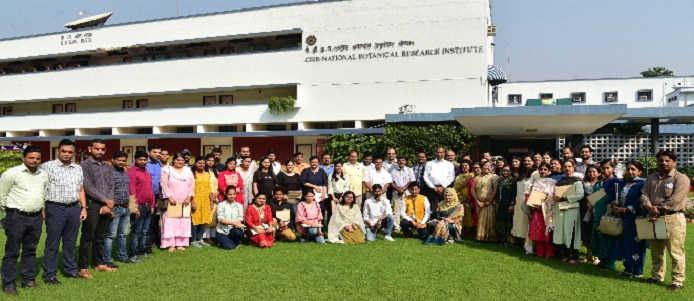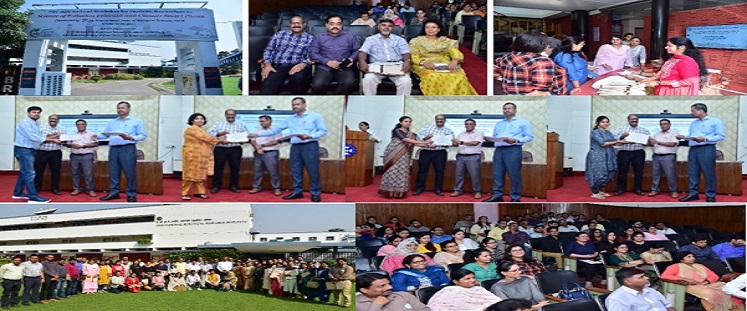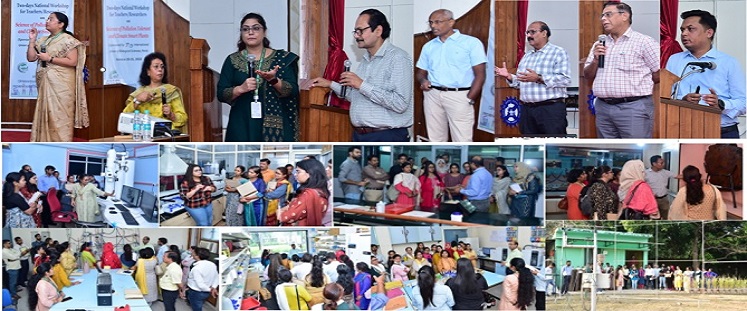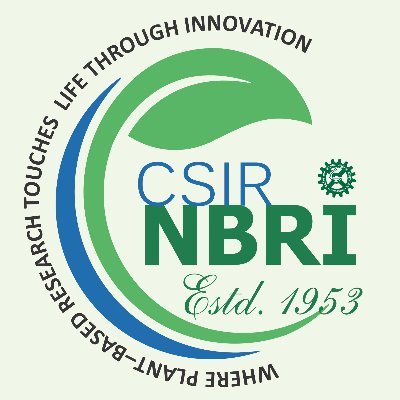IUBS Country Level Workshop
COUNTRY LEVEL WORKSHOP-Science of pollution-tolerant and climate smart plant's 20 th -21 st October, 2022.
In the workshop, 96 faculties from different universities and colleges, and research students participated. On October 20, 2022: Prof S.K. Barik, President ISEB and Director, CSIR-NBRI welcomed the participants and highlighted the significance of the workshop and the importance of IUBS manual which deals with the mechanism of tolerance undertaken by plants to develop resilience and different simple methods to screen tolerant traits in plants against pollution and climate change.

Lectures 1(Pollution Tolerance in Plant: Sulphur Dioxide) and Lecture 2 (Pollution Tolerance in Plant:Oxides of Nitrogen) were taken by Dr. Richa Rai, Senior Scientist CSIR-NBRI, where she highlighted the mechanism of action of plants against SO2 and oxides of nitrogen. She discussed the significance of the different plant-tolerant traits against SO2 and oxides of nitrogen.
Lecture 3 (Pollution Tolerance in Plant: suspended particulate matter) was taken by Dr. Nandita Singh, Former Senior Principal Scientist CSIR-NBRI and Additional Secretary ISEB . She enumerated different tolerant traits in plants that can be targeted for identifying SPM-tolerant plants.
Lecture 4 (Methods to analyze suspended particulate matter on the plants) in which Dr. Anju Patel, Scientist CSIR-NBRI, discussed different techniques for estimation of dust load or screening SPM tolerant plants.
Lecture 5 (Pollution tolerance on plants: Troposphere Ozone) was taken by Dr. Vivek Pandey, Chief Scientist CSIR-NBRI, where he discussed in detail about defense mechanisms induced in plants to confer tolerance against tropospheric O3.
After the lectures the participants visited Herbarium, Exposition, SEM and TEM and ICP-MS facilities.
On day 2 (October 21, 2022), five lectures were conducted.:
Lecture 6 (Plant responses to elevated carbon dioxide) was taken by Dr. Shekhar Mallick, Principal Scientist CSIR-NBRI, where he discussed the evolution of C3 and C4 plants with respect to elevated CO2 and different traits which may help plants to sequester more CO2.
Lecture 7 (Tolerance in plants to rising temperature) was taken by Dr. Richa Rai in which she highlighted the role of plants in mitigating the problem of urban heat islands and identification of traits responsible for thermo-tolerance in plants.
Lecture 8 (Drought tolerance in plants) was taken by Dr. R.D Tripathi, Former Chief Scientist CSIR-NBRI and Secretary ISEB, where he discussed about molecular mechanisms related to drought tolerance in plants and gave various examples of drought-tolerant crop plants.
Lecture 9 (Drought tolerance mechanism in the plant) delivered by Dr. P.A Shirke, Chief Scientist CSIR-NBRI, dealt with different mechanisms of drought tolerance where he highlighted the role of eco-physiological studies and simple analytical methods to identify drought-tolerant plants.
Lecture 10 (Niche modeling and its applications in plant ecology and climate change research) where Dr. Dibyendu Adhikari, Principal Scientist CSIR-NBRI, highlighted the significance of niche modeling and species distribution under future climate change.
After different lectures participants visited Botanical Garden, and Central Instrument Facility where they came to know about GC-MS and Free Air CO2/O3 concentration enrichment (FACE) and Free Air Temperature enrichment (FATE) facility to see research conducted on climate change and air pollution. A soft copy of the IUBS manual was also distributed to participants in a pen drive.
The two-day workshop ended with a valedictory function. The participants gave their feedback on the Workshop. They wanted more hand-on training sessions. This was followed by Certificate distribution to participants.



